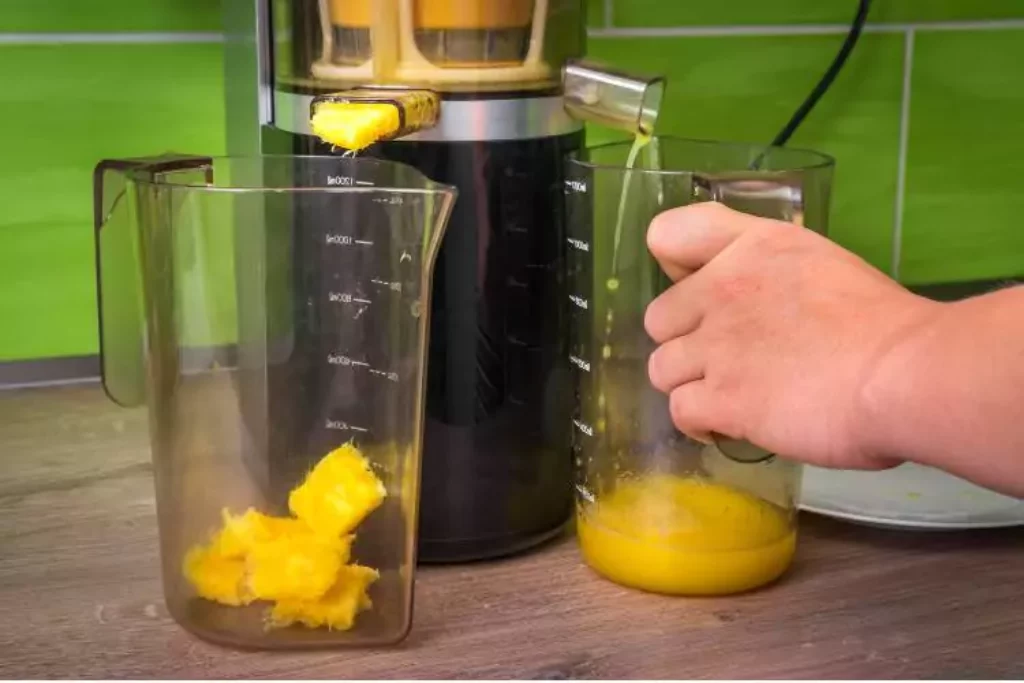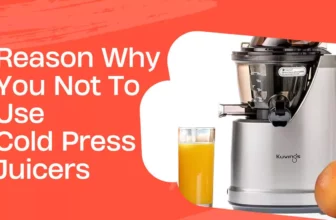
Before seeking out a slow juicer, it’s essential to understand its characteristics and determine whether its advantages are genuine or just marketing tactics to attract buyers.
If you are passionate about fitness or health, it’s likely that you’re in search of a juicer that offers health benefits. A slow juicer, also known as a cold press or masticating juicer, is often considered one of the healthiest juicing machines and is generally preferred by professionals. Slow juicing minimizes oxidation (with almost no heat generated) during juice extraction from fruits, which better preserves enzymes and nutrients.
There is some confusion regarding the Slow Juicer. In this article, we will attempt to understand the features and characteristics of these juicers to determine whether they truly offer health benefits or if it’s just a myth. Let’s get started.
What is a Slow juicer?
A slow juicer is a process of extracting juice from fruits at a very low speed and pace, and it could be of different types like crushing, squeezing, or other processes.
A slow juicer is a method of extracting juice using a machine that operates at low RPM, ensuring minimal heat generation and oxidation. This process is often referred to as slow juicing, and the machine itself is called a slow juicer. Often, it is known as a Masticating Juicer or a Cold Press Juicer.
This type of juice extractor is among the latest and most efficient on the market, delivering maximum nutrition from the juice and achieving the highest yield from the produce.
With a slow juicer, there’s minimal waste. The leftover pulp is drier, indicating more juice extraction and higher vitamin content. A Slow Juicer or Cold Press Juicer processes fruits and vegetables at low temperatures using a single auger, twin gears, or a press mechanism.
It’s important to note that Slow Juicers are essentially the same as Cold Press Juicers; the term emphasizes the low RPM operation, which helps retain nutrients.
Are Slow Juicers Truly Beneficial for Health?
Many people question whether slow juicers, also known as cold press juicers, offer more health benefits compared to other types of juicers. The answer is yes. Slow juicers operate at low RPM, which means they don’t generate heat. This lack of heat is a crucial factor in ensuring that the juice retains more nutrients, making it beneficial for health.
Slow juicers, often referred to as masticating or cold press juicers, stand apart from traditional juicers like centrifugal models. Centrifugal juicers operate at a higher RPM, generating heat during the juice extraction process from fruits. In contrast, a slow juicer runs at a lower speed, taking more time to extract juice by gently pressing the fruit. This method results in less pulp, minimizes waste, and ensures nearly every drop of juice is extracted. Most importantly, this process better preserves the nutrients found in fruits and vegetables. Now, let’s delve into the primary health benefits of using a slow juicer.
Higher Nutrient Content: Slow juicers squeeze out juice gently. This means you get more vitamins and good stuff from your fruits and veggies.
Increased Absorption of Nutrients: The juice made from slow juicers is easier for our bodies to take in. So, you get more benefits from your drink!
Yields More Juice: These juicers can get more juice out of the same amount of fruits or veggies as other machines. This means less waste!
Low Noise: Slow juicers are quieter. So, you can make juice without making a lot of noise or waking anyone up.
Blockage-Free Operation: Slow juicers don’t get clogged up easily. This means smoother juicing and less stopping to fix jams.
Which is Better: A Centrifugal Juicer or a Slow Juicer?
Centrifugal juicers operate at high speeds, using a spinning blade to quickly extract juice from fruits and vegetables. This high-speed process can generate heat, which might lead to a reduction in some nutrients within the juice. While they are swift and convenient, the juice produced might have a slightly lower nutrient content and a shorter shelf life due to oxidation. Also, these juicers can be quite loud. However, they’re often user-friendly, being relatively straightforward to assemble and clean.
On the other hand, slow juicers, also known as masticating or cold press juicers, work at a slower pace, using a squeezing or pressing mechanism for extraction. This method means there’s minimal heat involved, helping to keep more nutrients and enzymes intact in the juice. As a result, the juice from slow juicers tends to be of higher quality, with a richer flavor and a longer shelf life. They’re also quieter in operation. Further, they’re generally more efficient, especially with diverse ingredients like leafy greens and soft fruits. Some models even have the added versatility to make things like nut butter and sorbets.

So the question remains the same: Which is better? It depends on what you’re looking for. If speed and convenience are top priorities and you can compromise a bit on nutrient retention, a centrifugal juicer could be your best bet. Regardless, if you’re leaning towards maximum nutrient preservation and juice quality, a slow juicer might be the way to go. Your choice should reflect your individual needs, preferences, and the ingredients you intend to juice.
Final Words
I hope you’ve gained all the necessary information about slow juicers and their benefits. If you still have any misconceptions or additional questions, feel free to write to us; our experts will reply promptly.
A slow juicer does offer distinct advantages. While it’s more expensive and slower than a regular, traditional juicer, its health benefits are noteworthy. Traditional juicers, on the other hand, are faster and more convenient, producing larger quantities of juice in less time. For general kitchen use, a centrifugal or traditional juicer might be preferable. However, for those prioritizing health benefits and seeking a premium juicing experience, a slow juicer is an excellent choice, provided the price point isn’t a concern.





